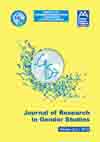Trauma, virtuel et pulsions: vers un « devenir inorganique » de la mondialisation?
Trauma, virtual and drives: toward "become inorganic" of globalization?
Author(s): Jacques Brunet-Georget Subject(s): Gender Studies
Published by: Addleton Academic Publishers
Keywords: globalization; trauma; death drive; sex drive; virtual
Summary/Abstract: This paper aims to examine the unpublished reports between the death drive, sex drive, and gender identity in the context of virtual technologies of globalization, from analyses of Teresa de Lauretis. In her latest book, Freud’s Drive (Original Title: Freud’s Drive. Psychoanalysis, Literature and Film. (2008), New York: Palgrave Macmillan) [Teresa de Lauretis, Instincts Freud ‒ Psychoanalysis, Literature and Cinema, (2010). Trans. fr. by Jacques Brunet-Georget. Paris: PUF], the American theorist departs from a comparison of the early twentieth century and early twenty-first century of our postmodern, based on a reflection on September 11, 2001 and the new contributions of globalization. The attacks of September 11 revealed a rupture in the fabric of the Western world that has reached the proportions of a societal trauma. According to T. de Lauretis, this situation is not so far removed from that of the 1900s, marked by the trauma of World War I, except that the globalization of the geopolitical space (cyberspace, bacteriological threat, chemical warfare, etc. ...) makes more diffuse impact of trauma. In this perspective, Teresa de Lauretis is based on the results of psychoanalysis. In a Western world ravaged by World War I, Freud observed in 1920 some traumatic neuroses in his patients and made the assumption that the compulsion to repeat the unpleasant experience or even more painful one would come from an unconscious drive, pushing towards self-destruction, at work in the human body: the “death instinct.” The challenge of Teresa de Lauretis is to update the theory of the death drive in terms of trade globalization. Globalization is understood here under three aspects: the new terms of geopolitical trauma, the impact of technology of instant and virtual communication, the network of a “biopower,” to borrow a phrase from Michel Foucault, who describes the living (exploitation of organic animal life, bio-technological innovations ...) in the middle of relations of power that are in permanent recomposition. Teresa de Lauretis locates a “death pulsion” in the heart of global capitalism, which would have an “unorganic become,” and hypothesizes that this paradoxical pulse is closely linked to new forms of sexual drive.
Journal: Journal of Research in Gender Studies
- Issue Year: 2/2012
- Issue No: 1
- Page Range: 28-47
- Page Count: 20
- Language: French
- Content File-PDF

